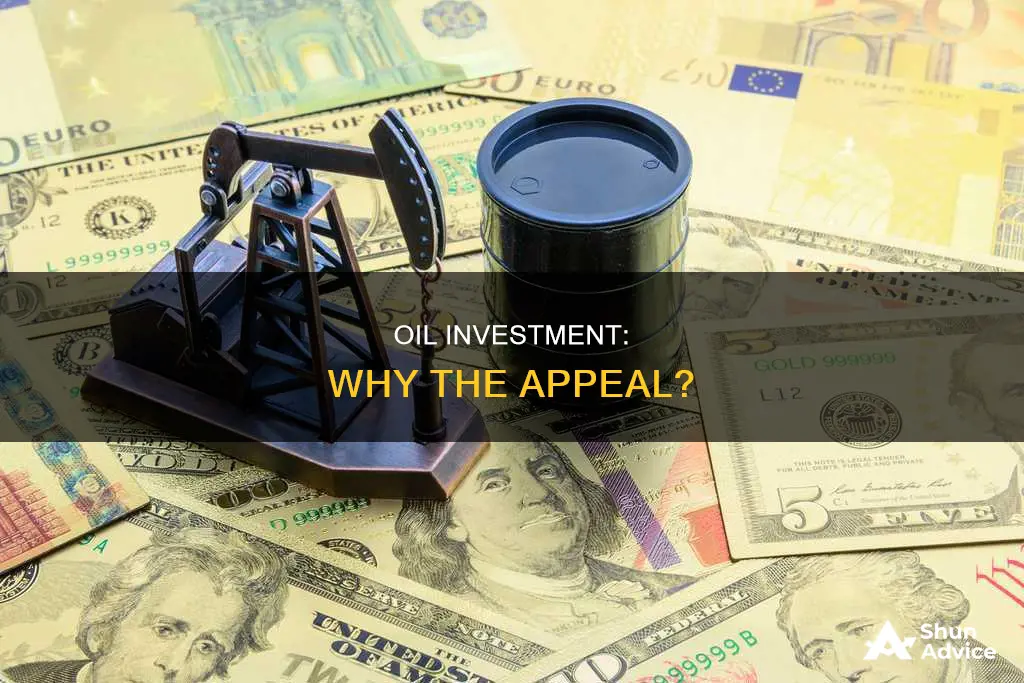
Oil and gas stocks are a common investment, but they are a risky business. The industry has experienced significant market volatility in recent years, with the price of oil fluctuating wildly. However, oil investments can also be highly profitable, with the potential for high rates of return and strong passive income. Oil is a global commodity, and demand is high, with the U.S. Energy Information Administration (EIA) estimating the world's demand for oil at more than 98 million barrels per day in 2023. Oil is also seen as a portfolio diversifier and a hedge against inflation.
There are several risks associated with investing in the oil and gas industry. Firstly, the industry tends to include cyclical businesses, meaning investors will likely experience booms and busts. Secondly, oil and gas companies face factors beyond their control, such as the price of oil, which is a major factor in stock valuations. When prices are low, these stocks are often punished by the market. Thirdly, oil and gas exploration is unpredictable, and the inherent uncertainty of exploration can result in large losses from investments that don't pan out.
Despite the risks, oil and gas stocks can be smart investments if timed right. With improved technology and a shift to developmental drilling, the dynamics of investing in oil and gas have changed, and the risk has lowered. Additionally, oil and gas projects offer attractive tax incentives, and direct energy investments have low correlations with other traditional asset classes.
| Characteristics | Values |
|---|---|
| Passive income | Long-term passive income |
| Returns | High rates of return |
| Inflation | Hedge against inflation |
| Diversification | Portfolio diversification |
| Tax | Significant tax benefits |
| Exploration | Exploration is unpredictable |
| Volatility | Market volatility |
| Dividends | Attractive dividend income |
What You'll Learn

Oil is a portfolio diversifier and a hedge against inflation
Oil is sometimes seen as a portfolio diversifier and a hedge against inflation. Commodities, including oil, are often recommended by experts as a diversifier asset class. Commodities tend to have a low to negative correlation with stocks and other traditional asset classes. As such, commodities can provide some diversification and decrease the overall portfolio risk.
Commodities prices, including oil, typically rise when inflation is accelerating, and they offer protection from the effects of inflation. As the demand for goods and services increases, the price of goods and services rises, as does the price of the commodities used to produce those goods and services. Few assets benefit from rising inflation, but commodities usually do.
In addition, commodities are considered a hedge against inflation due to their intrinsic value. Commodities tend to perform well when prices for consumer goods are on the rise, while equities tend to perform poorly when high inflation leads to increases in interest rates. Research by Vanguard points out that over the last decade, commodities rose by 7% to 9% for every 1% of unexpected inflation experienced by the economy.
Oil is a global commodity. The U.S. Energy Information Administration (EIA) estimates the world's demand for oil at more than 98 million barrels per day in 2023, an all-time high. In 2023, approximately 101 million barrels of oil were produced each day, another new record. However, oil exploration has seen a slowing trend since 2014.
The oil market can be very confusing for investors, with large price fluctuations occurring daily. The price of oil in the market depends on supply and demand, but its supply is somewhat controlled by the OPEC cartel. Different grades of oil trade under different markets, such as West Texas Intermediate (WTI) or Brent.
Fidelity Investments: Customer Feedback
You may want to see also

Oil investments can be profitable during economic growth
Firstly, oil investments can be a good hedge against inflation. Oil and gas prices and inflation can move in tandem, so investors can protect their portfolios from the negative effects of inflation by investing in oil. Oil investments can also be a good portfolio diversifier, as oil prices are largely uncorrelated to stock market returns or the direction of the US dollar.
Secondly, oil companies often pay dividends, which can be attractive to investors. Dividends allow investors to make regular income from their investments. However, there is a significant risk that the dividend can be cut if the company is unable to earn enough revenue to fund the payments to investors.
Thirdly, oil prices tend to rise during periods of economic growth, and oil companies can benefit from this through increased cash flow, which they can use to drill additional wells, increase production, and generate greater returns for shareholders.
However, it is important to note that oil investments are risky. Oil and gas stocks tend to be more volatile than the broader market as they are sensitive to changes in the supply and demand of the underlying commodities. There is also the risk of accidents, such as oil spills, which can cause a company's share price to plummet.
In summary, while oil investments can be profitable during economic growth, investors should carefully consider the risks before investing in this sector.
Jesus Invested in People Through Love and Sacrifice
You may want to see also

Oil companies pay dividends
Oil companies have historically been strong dividend stocks. Dividends allow investors to make regular income from their investments. Dividend investing is a good option for long-term investors who don't want to constantly monitor the oil markets. Dividends are also attractive to investors because they provide a stream of passive income.
Some oil companies have been increasing their dividends annually for decades, with management prioritising dividend preservation. For example, Chevron has increased its dividend for 36 consecutive years, and ExxonMobil has done so for 39 years. These companies have demonstrated a long-term commitment to increasing the capital returned to shareholders by way of a dividend.
However, there is a significant risk that the dividend can be cut if the company is unable to earn enough revenue to fund the payments to investors. This risk is intertwined with the volatility of commodity prices. If companies earn less revenue from the sales of their products, they are less likely to fund regular dividend payments.
When evaluating an oil company as a potential investment, it is important to not just look at the dividend yield (the dividend-to-share price ratio) but also to compare the yield to the company's free cash flow. The best companies can pay their total dividend obligations and fund their capital expenses using free cash flow, with some money left over. It is also important to look for a strong investment-grade balance sheet, as this provides additional financial flexibility and increases the probability that the company can maintain its dividend during downturns.
Madoff Victims: A Long List of Investors
You may want to see also

Oil prices are dictated by supply and demand
Oil is a high-demand commodity, and its price is dictated by supply and demand. When demand is high and supply is low, prices increase, and when demand is low and supply is high, prices decrease.
The price of oil is set in the oil futures market, where traders buy and sell oil futures contracts—binding agreements that give the buyer the right to purchase oil by the barrel at a predefined price on a predefined future date. The majority of these traders are speculators, betting on price moves, and hedgers, limiting the risk in the production or consumption of oil.
The demand for oil is driven by its use in fuels, with gasoline for cars and airline travel being two key examples. The supply of oil is controlled to some extent by OPEC, a cartel of oil-producing nations.
The price of oil is also influenced by the cost of extracting and producing it, which is generally high due to the complex and costly nature of setting up oil extraction. Oil companies may take years to develop oil fields, and once they are in production, they often have to continue extracting oil even when prices fall because the equipment used for extraction has no other use.
Oil prices can also be influenced by factors such as advances in extraction technology, natural disasters, and geopolitical events. For example, the COVID-19 pandemic caused a drop in demand as people stopped travelling, while the Russian invasion of Ukraine in 2022 disrupted oil markets and caused prices to surge.
Investing: A New National Pastime?
You may want to see also

Oil is a global commodity
The price of oil is largely determined by supply and demand, but its supply is somewhat controlled by the OPEC cartel. Different grades of oil trade under different markets, such as West Texas Intermediate (WTI) or Brent. Oil prices are also influenced by investors and speculators bidding on oil futures contracts.
The oil market can be very confusing, with large price fluctuations occurring daily. These fluctuations are influenced by a variety of factors, including changes in supply and demand, OPEC's actions, and the activities of investors and speculators.
Investing in oil can be risky due to price volatility, the possibility of accidents such as oil spills, and the impact of global events. However, it can also be highly profitable, especially for long-term investments. Oil companies often pay dividends, making them attractive to investors.
The benefits of investing in oil include the potential for high rates of return, diversification of investments, and a hedge against inflation. Oil drilling programs also provide tax advantages due to depreciation and depletion allowances.
In summary, oil is a global commodity with a high demand that is expected to increase. Investing in oil can be risky but also offers potential high returns and diversification benefits.
Savings Indirectly Matched with Investors
You may want to see also
Frequently asked questions
Oil is a global commodity that is in high demand. The price of oil is largely determined by supply and demand, and when prices are high, oil companies tend to generate large profits. Oil investments can be a good way to diversify a portfolio and protect it from short-term market fluctuations.
The oil market is highly volatile, and investments in this sector are considered risky. The price of oil is susceptible to significant fluctuations, which can cause substantial losses for investors. Oil companies also face the risk of accidents, such as oil spills, which can have devastating consequences and lead to sharp declines in stock prices.
Oil investments offer the potential for high returns, especially during periods of low-interest rates. They can also provide a hedge against inflation, as oil prices and inflation tend to move together. Additionally, oil investments come with attractive tax incentives, as governments often provide tax breaks to encourage investment in the energy sector.
There are several ways to invest in oil, including buying stocks of oil companies, investing in energy-sector ETFs or mutual funds, or through exchange-traded funds (ETFs) or exchange-traded notes (ETNs) that track oil prices more directly.







